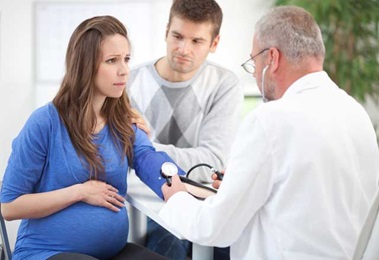Antidepressants and Pregnancy: What to Know
Most pregnant women want to do everything right for their baby, including eating right, exercising regularly and getting good prenatal care. But if you’re one of the many women who have a mood disorder, you might also be trying to manage your psychiatric symptoms as you prepare to welcome your new baby.
It’s common for doctors to tell women with mood disorders to stop taking drugs like antidepressants during pregnancy, leaving many moms-to-be conflicted about giving up the medications that help keep them healthy.
However, stopping your medication may not be the right approach. Women can — and should — balance their mental health needs with a healthy pregnancy.
Antidepressants and Pregnancy
Women who take antidepressants, such as selective serotonin reuptake inhibitors (SSRIs), during pregnancy may worry about whether the medications can cause birth defects.
There is generally no need to taper off medications during pregnancy, because antidepressants have not been known to cause birth defects.
In fact, untreated mental illness itself poses risks to a developing fetus. A woman who is depressed is less likely to get good prenatal care and more likely to engage in unhealthy or dangerous behaviors, like smoking and substance use.
Furthermore, mental illness itself in a pregnant mother has direct effects on newborns. Untreated depression may increase preterm birth or cause low birth weight, and babies of depressed moms have higher levels of a hormone called cortisol at birth. This raises a baby’s risk of developing depression, anxiety and behavioral disorders later in life.
Weighing the Risks
While doctors don’t believe antidepressants cause birth defects, it’s still possible for them to affect the baby. It’s important for a mother and her doctor to know the risks.
About 30 percent of babies whose mothers take SSRIs will experience neonatal adaptation syndrome, which can cause increased jitteriness, irritability and respiratory distress (difficulty breathing), among other symptoms. Doctors aren’t sure whether this effect is due to the baby’s withdrawal from the SSRI after birth or exposure to the drug itself before birth. While these symptoms may cause concern, in most instances they will alleviate on their own. In fact neonatal adaption syndrome can also occur in babies whose mothers do not take SSRIs during pregnancy.
Common medications women frequently ask about include:
- SSRIs: Some studies link SSRI use with a very rare defect called persistent pulmonary hypertension, which is a condition where babies’ lungs don’t inflate well. However, a recent large study with 3.8 million participants showed no increased risk of this condition.
- Paroxetine: Early studies on a small number of patients connected the SSRI paroxetine with cardiac defects in babies. However, these studies didn’t account for smoking, obesity and other risk factors that are more common in women who have depression. Larger, more recent studies show no such link with cardiac defects. If paroxetine is the only medication that works it is not recommended to switch medications.
- Benzodiazepines: Women should avoid using tranquilizers, such as diazepam, alprazolam and clonazepam, in high doses during pregnancy because they can lead to sedation and respiratory distress in the newborn. You can still use them in small doses for short periods of time although your doctor may recommend intermediate-acting options like lorazepam. These medications don’t linger in the baby’s bloodstream like longer-acting forms and aren’t associated with higher risk of substance use disorder like shorter-acting forms.
- Valproic acid: This medication treats seizures and bipolar disorder, and does carry significant risk to a developing fetus. Taking valproic acid during pregnancy carries a 10 percent risk of neural tube defects — birth defects that affect the brain or spinal cord, such as spina bifida — as well as risks to the baby’s cognitive development, such as lower IQ. Because of these risks, Valporic acid is only recommended if all other treatment options have failed.
Seeing a Reproductive Psychiatrist
If you have a mood disorder, you may benefit from speaking with a reproductive psychiatrist when you are pregnant or thinking about becoming pregnant. Ideally, this should happen when you are planning for pregnancy, although this isn’t always possible. Meeting with a doctor after you become pregnant is not too late.
Generally, your doctor will try to limit the number of potentially harmful exposures to the baby. This means considering the number of medications a mother is on, as well as her psychiatric illness. If a woman takes a low dose of many medications, a doctor will typically recommend reducing the overall number of prescriptions while also increasing the dose of the most effective medications – in these cases, it is preferable to address the illness instead of exposing the baby to many medications and a partially-untreated illness.
If your illness is mild, your doctor might recommend getting off medication and replacing it with treatments such as psychotherapy, prenatal yoga or acupuncture to improve your mood.
Ultimately, women should weigh the risks of medication against the risk of untreated illness. If a particular side effect is extremely rare, it’s still a very rare event even if you double the risk. Medication risks are typically not greater than those of untreated mental illness, and because of this most doctors only switch medication for pregnant women after carefully considering the patient's individual illness and medications.






